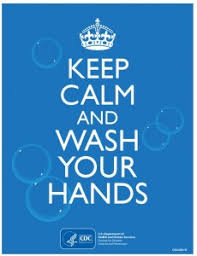Friends, it seems that we have our first case of coronoavirus in Oregon as of yesterday. It was only a matter of time. We are people of faith, so I know your first impulse is not to panic. It seems a good time to go over a few things, though, so I attach here (in English and Spanish) the suggestions from the Episcopal Bishop of Los Angeles who recently traveled in the far east. One reason I attach her suggestions is because of her experience recently, but also, because it is in English and Spanish! The practicality of these suggestions is good – don’t go out if you’re sick, Wash your hands! Wash your hands! Wash your hands!
But, before we get to that – here’s my plan for Holy Cross – I’m going to head out this morning to purchase hand sanitizer for each pew (hoping there has not been a run at the store!). AND, I wonder if any of you could come to church EARLY tomorrow (Sunday) like 9 am – to wipe down the pews with disinfectant wipes? come on down!
Here’s my next point – we have a large worship space, if you wish to sit apart from others please feel free to do so. Also,I plan to modify the sharing of the peace for the time being – smiling and nodding at your friends is completely appropriate, without necessarily shaking hands or hugging – I personally suggest a small wave at each person complete with a lovely smile. As your pastor, I plan to step out to wash my hands before communion besides the usual hand sanitizer just because I think it will make me feel better.
In the event of more widespread disease, we will revisit these thoughts, my friends, but I want you to be at peace. You can come to church, and protect yourself and others. Here is the bishop’s letter:
My siblings in Christ:
Lenten blessings.
As you may know, I recently returned from nearly two weeks in South Korea and Taiwan. Bishop Taylor asked me to share with colleagues and the whole diocese my experience of how churches close to the epicenter are handling the COVID-19 (coronavirus) outbreak. These are guidelines for us all to follow – at church, at home, and at work — as concern grows about the possibility of further outbreaks in the United States:
1. Wash your hands frequently with soap and water for at least 20 seconds. All the time. All day long. Many of you may know that before I celebrate Holy Eucharist, I always find a sink and wash my hands with soap and water. Especially now, this is a good precaution for the celebrant so people can know the church is taking this situation seriously.
2. Alcohol-based liquid hand sanitizer should be used by anyone distributing communion bread and wine.
3. In both Korea and Taiwan, intinction was preferred to drinking from the common cup. Many received the bread and acknowledged the cup with a bow as it came by. This is a good moment to remember a core principle of our Eucharistic theology: That the sacrament is complete when administered in just one kind (in this case, the consecrated bread).
4. At the peace, people bowed to one another or waved and said “Peace be with you” to their neighbors. No handshakes or hugging.
5. At all times, avoid touching your eyes, nose, and mouth – the places germs enter the body.
6. When you cough, cough into your bent elbow, not into your hand. If you have to blow your nose, dispose of the tissue as soon as possible in a waste container with a lid that closes and either wash your hands immediately or use an alcohol-based liquid to sanitize your hands.
7. Keep your distance. We don’t have to be in each other’s faces to talk. This is particularly important if someone is coughing or sneezing.
8. Try to avoid large crowds, especially where you will be cramped or pushed together. I know this is hard for people who commute on buses or trains.
9. Whenever possible, use Zoom, GoToMeeting, or Skype for meetings.
10. If you’re sick, stay home! Encourage others to stay home if they’re sick. Don’t hesitate to go to the doctor and to urge others to do so.
11. Create systems for wellness checks in the congregation, especially older people whom you haven’t seen for a while.
12. If your congregation has a food ministry, follow the World Health Organization’s recommendations regarding food safety.
Up-to-date information is a good antidote for anxiety. Visit the website of the World Health Organization for frequent updates. Go to the page below and click “Protect Yourself” to find downloadable materials in Chinese, English, Spanish, and other languages as well as information about how to deal with anxiety over the disease: https://www.who.int/
The biggest lessons from my Asia visit are to use common sense, don’t be anxious, get plenty of rest, and eat as healthily as you can.
Holy and gracious God, give us the strength to meet the health crisis looming around us. Enlighten researchers that they may discover the right vaccine against this disease. Guide the doctors, nurses and all medical technicians working with those who are infected to take correct actions for their care. Protect all medical staff and family or friends caring for those who are ill. Bring together the governments and governmental agencies around the world to work together to eradicate this health threat. All this we ask through Jesus Christ our Lord. Amen.
Yours in Christ,
The Rt. Rev. Diane Jardine Bruce
Bishop Suffragan
Diocese of Los Angeles
______________________________
Mis hermanos en Cristo:
Bendiciones cuaresmales.
Como sabrán, recientemente regresé de casi dos semanas en Corea del Sur y Taiwán. El Obispo Taylor me pidió que compartiera con mis colegas y toda la diócesis mi experiencia de cómo las iglesias cercanas al epicentro están manejando el brote de COVID-19 (coronavirus). Estas son pautas que todos deberíamos de seguir, en la iglesia, en el hogar y en el trabajo, a medida que aumenta la preocupación sobre la posibilidad de nuevos brotes en los Estados Unidos:
1. Lávese las manos frecuentemente con agua y jabón por al menos 20 segundos. Todo el tiempo. Todo el día. Muchos de ustedes saben que antes de celebrar la Sagrada Eucaristía, siempre encuentro un lavabo y me lavo las manos con agua y jabón. Especialmente ahora, esta es una buena precaución para el celebrante para que la gente pueda saber que la iglesia está tomando en serio esta situación.
2. Cualquier persona que distribuya pan y vino de comunión debe usar desinfectante líquido para manos a base de alcohol.
3. Tanto en Corea como en Taiwán, se prefiere mojar el pan directamente en el cáliz que a beber de él. Muchos recibieron el pan e hicieron reverencia hacia el cáliz al pasar. Este es un buen momento para recordar un principio básico de nuestra teología eucarística: el sacramento esta completo cuando se administra un solo tipo (en este caso, el pan consagrado).
4. Durante la paz, la gente hizo reverencia el uno al otro o saludó y dijo “La paz sea con usted” a su vecino. Sin darse la mano ni abrazo.
5. En todo momento, evite tocarse los ojos, la nariz y la boca – los lugares donde los gérmenes entran al cuerpo.
6. Cuando tosa, tosa en el codo doblado, no en la mano. Si tiene que sonarse la nariz, tire el pañuelo lo antes posible en un basurero con una tapa que se cierre y lávese las manos inmediatamente o use un líquido a base de alcohol para desinfectar sus manos.
7. Mantenga su distancia. No tiene que estar cara a cara para hablar. Esto es particularmente importante si alguien tose o estornuda.
8. Trate de evitar grandes multitudes, especialmente en lugares donde estarán muy apretados o estrechos. Sé que esto es difícil para las personas que viajan en autobuses o trenes.
9. Siempre que sea posible, use Zoom, GoToMeeting o Skype para reuniones o juntas.
10. ¡Si está enfermo, quédese en casa! Anime a otros a quedarse en casa si están enfermos. No dude en ir al doctor y anime a otros a que hagan lo mismo.
11. Construya sistemas para controles de bienestar en la congregación, especialmente con las personas mayores a las que no ha visto por un tiempo.
12. Si su congregación tiene un ministerio de alimentos, siga las recomendaciones de la Organización Mundial de la Salud con respecto a la seguridad alimentaria.
La información actualizada es un buen antídoto para la ansiedad. Visite el sitio web de la Organización Mundial de la Salud para obtener actualizaciones frecuentes. Vaya a la página a continuación y haga clic en “Protect Yourself” (protéjase) para encontrar materiales descargables en chino, inglés, español y otros idiomas, así como información sobre cómo lidiar con la ansiedad sobre la enfermedad:
https://www.who.int/es/
Las lecciones más importantes de mi visita a Asia son usar el sentido común, no estar ansioso, descansar lo suficiente y comer lo más saludable posible.
Dios santo y misericordioso, danos la fuerza para enfrentar la crisis de salud que se avecina a nuestro alrededor. Ilumina a los investigadores para que puedan descubrir la vacuna adecuada contra esta enfermedad. Guía a los médicos, enfermeros y todos los técnicos médicos que trabajan con las personas infectadas para que tomen las medidas correctas para su cuidado. Protege a todo el personal médico y a la familia o amigos que cuidan a los enfermos. Reúne a los gobiernos y agencias gubernamentales de todo el mundo para trabajar juntos para erradicar esta amenaza a la salud. Todo esto lo pedimos por Jesucristo nuestro Señor. Amén.
Suya en Cristo,
La Reverendísima Diane Jardine Bruce
Obispa sufragánea
Diócesis de Los Angeles


